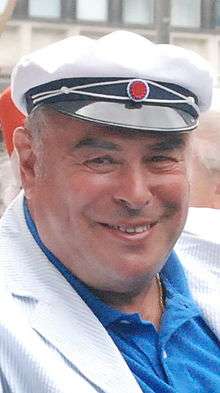Eri Klas

Eri Klas (7 June 1939 – 26 February 2016) was an Estonian conductor. He was born in Tallinn.[1]
Klas mainly worked in the Nordic scene since, but might be best known for his work leading the defunct Netherlands Radio Symphony Orchestra.
He premiered Alfred Schnittke's 1st Cello Concerto (Munich Philharmonic, 1986) and Peer Gynt ballet (Hamburg State Opera, 1989), and worked on the diffusion of the Estonian symphonic repertory.
Klas was also active as a pedagogue, holding professorships at the Sibelius Academy (1993–97) and the Estonian Academy of Music and Theatre (1997 until his death), where he received an honorary doctorate.
Klas was decorated with the Order of the Lion of Finland (1992, on the occasion of Finland's 75th Independence Day) and the Estonian Order of the White Star. He was a UNICEF Goodwill Ambassador. In 1986, he was named the People's Artist of the USSR. An Estonian lightweight junior boxing champion, he was also a member of the Estonian Olympic Committee.
References
- ↑ Eesti Entsüklopeedia, vol. 14, p. 167. (Tallinn, 2000.)
External links
| Wikimedia Commons has media related to Eri Klas. |
- Estonian National Cultural Foundation page on Eri Klas
- Tampere Philharmonic Orchestra page on Eri Klas
- Jewish Community in Estonia, February 2006 bulletin
| Cultural offices | ||
|---|---|---|
| Preceded by Norman Del Mar |
Chief Conductor, Aarhus Symphony Orchestra 1991–1996 |
Succeeded by James Loughran |
| Preceded by Kees Bakels |
Chief Conductor, Netherlands Radio Symphony 1996–2003 |
Succeeded by Hans Vonk |
| Preceded by Tuomas Ollila |
Chief Conductor, Tampere Philharmonic Orchestra 1998–2006 |
Succeeded by John Storgårds |